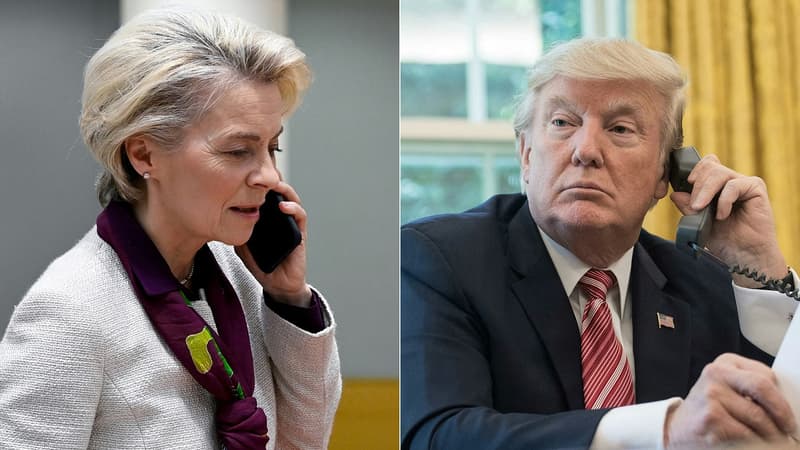Studious beginning of the week in Brussels. The European Union Trade Ministers meet on Monday to refine their strategy against the last Donald Trump initiative, which announced taxes on August 1 of 30% customs tariffs in European products imported to the United States.
The decision of the US president made a cold while the commercial negotiations were still ongoing between Brussels and Washington.
The president of the European Commission, which negotiates on behalf of the EU Member States, Ursula von der Leyen, prefers to recover the round.
“We prefer a negotiated solution”
The president of the European Commission announced on Sunday that the European Union was not going to retaliate at the time of American customs and aluminum customs tasks, hoping to obtain an agreement that would be less painful.
Therefore, negotiations must continue.
However, diplomats indicated that an additional package of additional reprisals would be presented to the ministers on Monday, measures that could be implemented if Donald Trump really would really opt for 30% taxes in imports of the European Union.
The EU has already threatened in May to impose customs duties in American products worth around 100 billion euros, including cars and airplanes, if the negotiations failed, even if a diplomat suggested that the final list had been reduced to a value of 72 billion.
European countries are trying to remain united in this case, although their savings are not exposed in the same way to the customs anger of US President.
Emmanuel Macron urged the European Commission on Saturday to “resolutely defend European interests” and “accelerate the preparation of credible countermeasures.”
German Chancellor Friedrich Merz said Sunday that he agreed with the French president, added that he had argued with him, with Ursula von der Leyen and Donald Trump in recent days. He claims to get involved “intensely” to try to reach a solution.
The Italian prime minister, Giorgia Meloni, warned Sunday against the perspective of a “commercial war” within the western world.
Steel and aluminum
Since his return to the presidency of the United States in January, Donald Trump has imposed duties of fluctuating and generalized customs to his allies and competitors, altering financial markets and feeding the fears of a global economic deceleration.
But his government is under pressure to conclude agreements with commercial partners after promising a series of agreements.
Until now, US officials have only revealed two agreements, with the United Kingdom and Vietnam, as well as a provisional reduction of customs duties with China.
The EU, like dozens of other savings, was to see the level of customs duties that Americans increased from a basic rate of 10% on July 9, but Donald Trump postponed the deadline for August 1.
In his letter sent to Brussels and became public on Saturday, the US president cited the importance of the United States commercial deficit against the EU to justify his new taxes of 30%.
This rate is much higher than that of 20% than the US president had presented in April, before returning when the stock markets collapsed.
In response to US customs’ tasks imposed on steel and aluminum, in parallel with those mentioned in other imports, the European Commission had prepared taxes on US products worth around 21 billion euros.
But in April he announced the suspension of these measures to give way to a broader commercial agreement with the Trump government. These taxes would take effect on the night of Monday to Tuesday, before being suspended again.
Source: BFM TV


